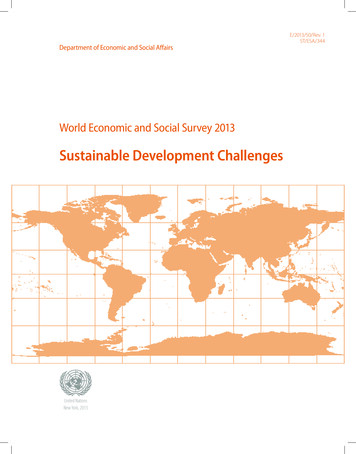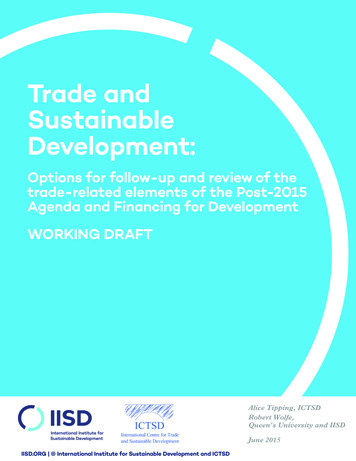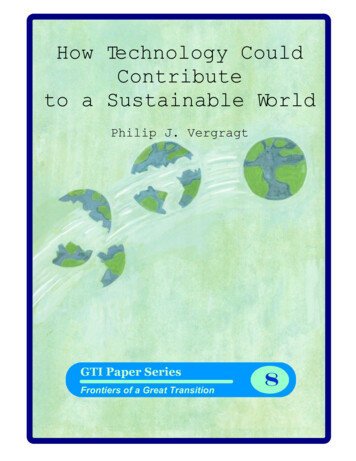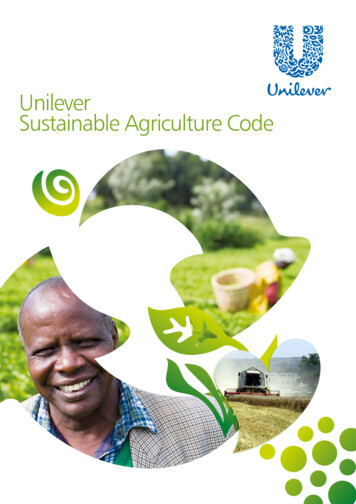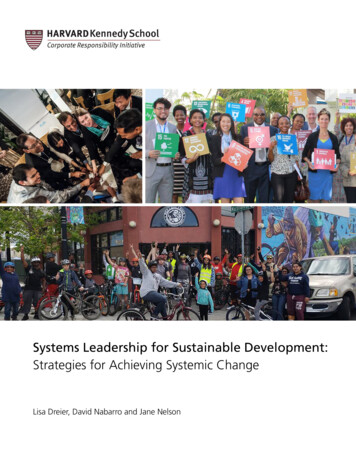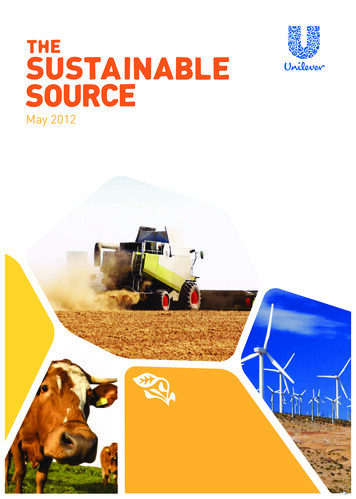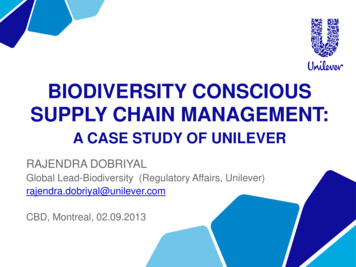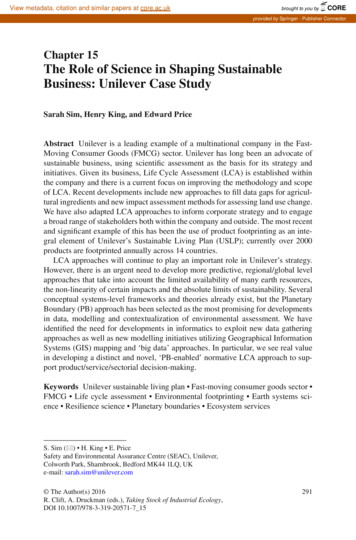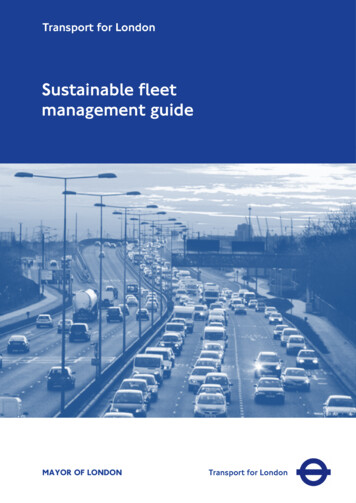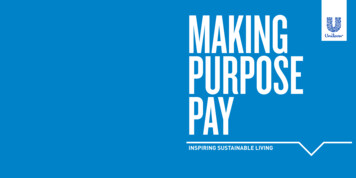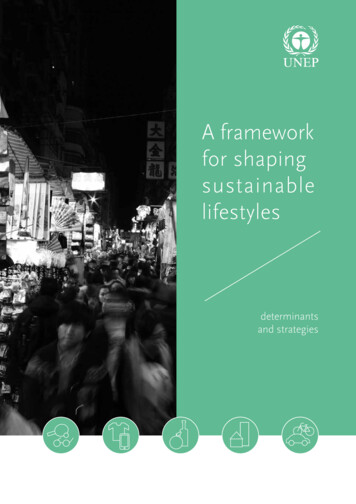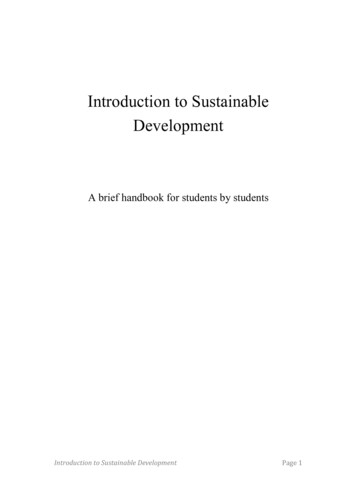
Transcription
Introduction to SustainableDevelopmentA brief handbook for students by studentsIntroduction to Sustainable DevelopmentPage 1
Published in 2015Introduction to Sustainable DevelopmentPage 2
Copyright 2015 International Hellenic UniversityThe writer of each scientific work has the exclusively and only responsibility forthe content of this publication, concerning the text, photos and otherinformation.The writer has the obligation to ensure, before the publication of his/herscientific work, the copyrights or the written grant of the copyrights, for thephotos and other information that are part of text and do not constitute his/hercopyright. The International Hellenic University has no responsibility for thecontent of the texts that are part of this collective tome over the practices andtheories of sustainable development and possibly are personal views orstatements of each writer, and it does not adopt in principle the views of thewriters of articles or possible comments or interventions.The International Hellenic University does not guarantee in any case, thecorrectness, the completeness or the availability of the content of the texts thatare in the collective tome publishing the practices of the Conference or theirresults.Introduction to Sustainable DevelopmentPage 3
AbstractThis handbook (Greek and English version) was prepared under the care of variousIHU professors while graduates and postgraduate students of the IHU Master ofScience in Environmental Management and Sustainability and other fields conductedthe composing part. It is the outcome of collective efforts and work. The purpose ofthis initiative is to create a simple, understandable and useful guide or tool for thereader, in order to understand the basic principles of sustainable development and theessential value of sustainability that contributes to the solution of various globalproblems and concerns.In this handbook you may find some basic definitions of terms concerningsustainability. Moreover, the three pillars of sustainability (environment, society,economy) are fully explained in various chapters. Also, the birth and evolution ofSustainable Development is illustrated while the role of the enterprise in sustainabledevelopment is demonstrated. In addition, the connection between Tourism,Cooperations and Sustainable Development is analysed. Furthermore, you may findchapters concerning The Impact of Urban Pollution in Sustainability and the Role ofCitizens in promoting sustainable development, while there is a chapter dedicated tothe Right to Environment: the principle of sustainability in the Greek legal order.Finally, there are some special contributions analysing various concepts that areconnected to Sustainable Development.Keywords: Sustainable Development, Handbook, Sustainability, StudentsGiorgos GoniadisOctober 18, 2015Introduction to Sustainable DevelopmentPage 4
Introduction to Sustainable DevelopmentPage 5
List of UNCEDUNFCCCUNWTOUSAWBWHOWTOCollaborative Awareness PlatformCost-Benefit AnalysisCentres for Management of Urban ResiduesConference of the PartiesCorporate Social ResponsibilityGerman stock indexDepartment of Economic and Social AffairsEuropean Environment AgencyEnvironmental Impact AssessmentELimination Et Choix Traduisant la REalitéElectromagnetic FieldEuropean UnionGross Domestic ProductGlobal Reporting InitiativeInternational Cooperative AllianceInformation and Communication TechnologyInternational Hellenic UniversityInternational Labor OrganizationInternational Monetary FundLife Cycle AnalysisLlifestyle Of Health And SustainabilityNon-Governmental OrganizationOzone-Depleting SubstancesOrganisation for Economic Co-operation and DevelopmentSustainable DevelopmentSmall and Medium EnterprisesUnited NationsUnited Nations Conference on the Environment and DevelopmentUnited Nations Framework Convention on Climate ChangeUnited Nations World Tourism OrganizationUnited States of AmericaWorld BankWorld Health OrganizationWorld Trade OrganizationIntroduction to Sustainable DevelopmentPage 6
Table of ContentsAbstract. 4List of Abbreviations . 6Table of Contents . 7Acknowledgments . 9Foreword from Prof. Nicolas Moussiopoulos . 10Foreword from Prof. Eftichios Sartzetakis . 12Introduction . 14Highlights of the 1st IHU International Conference on Sustainable Development. 16Definitions of terms . 21The Three Pillars of Sustainability. 25The birth and evolution of Sustainable Development . 29Sustainable Development and the Environment . 35The Social Dimension of Sustainable Development . 37Basic Economic Principles of Sustainable Development . 41Environmental Policy and Governance . 45The Role of the Enterprise in Sustainable Development: Corporate SocialResponsibility . 50Sustainable Development and Tourism . 54Cooperations and Sustainable Development . 57The Impact of Urban Pollution in Sustainability – the Role of Citizens . 62Right to Environment: the principle of sustainability in the Greek legal order . 69Contributions . Error! Bookmark not defined.Is sustainability worthwhile for companies? . 73Creating motives and tools in order to enable citizens to become “SmartCitizens”: A “socially-oriented” bottom-up approach towards sustainability. . 80Multi-criteria decision analysis as a decision making tool towards adaptation ofurban sustainability policies . 88Introduction to Sustainable DevelopmentPage 7
Table of FiguresFigure 1 - Source: http://www.thwink.org/. 25Figure 2 - Source: l#.VSL1gNysWSp . 32Figure 3 - The three pillars of sustainability . 62Figure 4 - Waste Management Hierarchy . 65Figure 5 - Pyramid of the levels of citizens’ interaction in order to enable citizensto become “Smart Citizens” . 82Figure 6 - The overall collective intelligence concept . 83Figure 7 - ICT towards collective intelligence . 84Introduction to Sustainable DevelopmentPage 8
AcknowledgmentsIn order to finalize this handbook, various people took part in different parts of itspreparation. We would like to thank Prof. Mousiopoulos, Prof. Sartzetakis and Dr.Banias for their continuous support and patience with us in relation to finalizing thishandbook.Furthermore, we have to thank Sofia Saouridou, whose assistance and dedicatedinvolvement in every step throughout the process, especially in the beginning, wasextremely motivating. Special thanks to Bakali Areti, Karanikolas Konstantinos,Lamprinaki Viktoria-Vasiliki, Melliou Kallithea, Melliou Xaroula, Mouchlia Dimitra,Ongari Katerina and Psimmas Thomas for participating in our efforts with texts.Finally, our warmest thanks have to be given to Savvina Papadaki, Viktoria-VasilikiLamprinaki and Nikos Manes for translating from English to Greek various chapters.Special thanks should be given to Ms Ogia Kourliti (philologist) for her immensesupport concerning the Greek version of this handbook.Giorgos Goniadis & Maria LampridiFinal EditorsIntroduction to Sustainable DevelopmentPage 9
Foreword from Prof. Nicolas MoussiopoulosHumanity in the 21st century is facing various environmental, social and economicproblems. Almost every government, various international organizations and privatestakeholders are facing challenges. The climate change effects and resources scarcityare constantly increasing, while their impact is not limited to a state but rather spreadall around the world. This, non-border parameter of environmental, social andeconomic problems, has rendered them into collective problems demanding jointefforts in order to reach a solution, or at least to mitigate the problems or their impact.Different approaches concerning successful ways to tackle these problems exist. Mostof these approaches lead to joint efforts, which need a specific framework in order toreach fruitful and solution-oriented policies. One successful approach is thesustainable development strategy framework. According to Brundtland Commissionsustainable development is the “development that meets the needs of the presentwithout compromising the ability of future generations to meet their own needs”.Sustainable development is a matter that primarily concerns states and enterprises, butit also concerns citizens equally. For instance, we tend to speak regularly aboutCorporate Social Responsibility while we undermine the value and importance ofPersonal Social Responsibility in our efforts to ameliorate the quality of life foreveryone.Taking into account these thoughts/ideas, the International Hellenic University,through the MSc in Environmental Management and Sustainability established apassionate group of students and recent alumni, called “Students for Sustainability”,drawn together by the common vision to promote and spread the ideas and principlesof sustainable development. Our main aim was to initiate and trigger our students’personal social responsibility. These initiatives led to the organization of aconference, the “1st IHU International Conference on Sustainable Development” thatpresented the practices of sustainable development in a non-academic framework byexperts, accessible to every single individual. This conference was a joint event, fullyorganized by our students in partnership with other regional authorities, nongovernmental organizations, institutions and enterprises, an event that revealed thecore value of joint initiatives in the framework of sustainable communities. In thecontext of “Students for Sustainability” activities to raise public and social awarenessconcerning issues of sustainable development, our students prepared this handbook inGreek and English. It was prepared under the guidance of IHU professors andacademics while graduate and postgraduate students of the IHU Master of Science inEnvironmental Management and Sustainability conducted the editorialpart.Introduction to Sustainable DevelopmentPage 10
Furthermore, distinguished professors in the field of sustainable development andenvironmental protection, such as Prof. Dr. Dr. Franz Josef Radermacher and Prof.Klaas Dirks Van Den Hout, contributed by writing some of the chapters in thehandbook.The purpose of this handbook is to create a simple, comprehensive, useful guide andtool for the reader, in order to understand the basic principles of sustainabledevelopment. Moreover, it seeks to present the essential value of sustainability thatcontributes to the solution of various global, regional and local problems andconcerns. Finally, our students seek, through this handbook, to promote and foster thesignificance of sustainable development in a greater context, as much in favor ofsociety, as of the economy and the environment.Professor Nicolas MoussiopoulosVice President of the Governing Board,International Hellenic UniversityIntroduction to Sustainable DevelopmentPage 11
Foreword from Prof. Eftichios SartzetakisThe continuously increasing severity of environmental problems led to a series ofreactions from independent organizations over the years, from the International Unionfor Conservation of Nature in 1948 to the Club of Rome and its report The Limits toGrowth in 1972. Focusing initially on environmental protection and natural resources’conservation the movement established, over the seventies and eighties, the linksbetween the environmental, economic and social dimensions. At the institutionallevel, the concept of Sustainable Development was coined at the United NationsConference on the Human Environment in Stockholm in 1972 and subsequentlydefined through the World Conservation Strategy (1980), the Brundtland Report(1987), and the United Nations Conference on Environment and Development in Rio(1992).Although in the ensuing decades, mainstream sustainable development thinking wasprogressively developed, the notion still remains vague and difficult to pinpoint tospecific international and national policies, business’ practices and citizens’ everydayactions. Thus, it is clear that more research is still needed but most importantlypractical knowledge and skills to apply the ideas and basic guidelines of sustainabledevelopment in all social and economic activities and primarily in the production ofgoods and services.Responding to this need, that was mainly uncovered in Greece, the InternationalHellenic University took the initiative in 2012 to develop a program of graduatestudies, the MSc in Environmental Management and Sustainability. The program’sprimary goal is to provide potential businesses and organizations’ staff with thenecessary theoretical knowledge and practical skills in order to manage operationssustainably to the benefit of the organization at which they work and the society atlarge.Having benefited from the courses and based on their strong drive to promotesustainability issues, the program’s students and alumni initiated a group ofvolunteers called “Students for Sustainability”. The most important among thegroup’s actions is the organization of the “1st IHU International Conference onSustainable Development” in May 2015. Although the conference had the support ofthe program and the University, it was the students that defined the topics andorganized, in collaboration with other regional authorities, non-governmentalorganizations, institutions and enterprises, what proved to be an extremely successfulevent.Introduction to Sustainable DevelopmentPage 12
Furthermore, it was the students’ idea to publish this volume that contains mainly theconference’s proceeding and selected other contributions. I would like to focus on thestudents’ initial idea of preparing a comprehensive guide to different views andapproaches of sustainable development. A volume created primarily by students forstudents and the public at large. I strongly believe that the volume achieves its targetand I would like to congratulate all those involved, including those that contributedtheir thoughts as well as those that participated in editing, preparing and publishingthis Handbook. As the Director of the program I am extremely proud of my studentssince I believe that their participation in this type of extracurricular activitiescontributes very positively to their own and the program’s development.Professor Eftichios SartzetakisDirector of the MSc in Environmental Management and Sustainability,International Hellenic UniversityIntroduction to Sustainable DevelopmentPage 13
IntroductionIn recent years, particularly since 2007, when the bubble in the US housing marketburst, the international community faced a global economic crisis that changedseveral social and economic beliefs. Bearing also in mind the complexity of the theoryof sustainable development, and the complexity of the global economy and thevarious interests, it became apparent that the traditional way of thinking and actingwas not only unsustainable but also detrimental to the environment, society and theeconomy. Therefore a new economic, social and environmental reality was presented,which pushed and pushes gradually societies to less wasteful and more sustainable,green or ecological behaviors, which in turn drives changes in business and socialactivities and perceptions. With the passage of time the need for joint coordination ofthe various strategies becomes obvious, while a further and fruitful application of bestpractices and decisions appears to be a promising solution, while the whole effortrequires comprehensive and constructive cooperation.It is important to emphasize that the sustainability of an activity concerns its longterm extension in the future; the sustainability in its present sense is a route, a processof humanity to be maintained in the finite ecosystem of the Earth. Sustainabilityhowever is not a specific, well-established concept, but an evolution to improve themanagement of natural and human systems through better understanding andknowledge. The main goal of sustainability is human survival and in this sense it isanthropocentric, but completely different from the "wild" or unlimited growth-growththat classical economics profess, for the simple reason that it places restrictions. Wecould say that it is a much broader concept than environmental protection, because italso presupposes long-term cultural change. Prerequisite is the adaptability of a state /people / culture. Apart from its ability to adapt, striving for sustainable developmentlargely involves innovation in terms of ideas, technology, actions etc. The problems tobe faced by humanity in the 21st century can not be solved by traditional means andpractices.Today, it is generally accepted that sustainability is a dynamic process based on threepillars, which interact with each other and they are not mutually exclusive. Eventhough there are interrelationships between these pillars, there is also one rudimentaryand logical hierarchy that is not often highlighted. Specifically, the environment is asuperior system and exerts long-term control over human systems of economy andsociety.Introduction to Sustainable DevelopmentPage 14
The road to sustainability has specific targeting which is presented in this handbook,but there are certain conditions that we must at least maintain and some others that weneed to develop or evolve in a positive direction.The challenges for sustainable development are both heterogeneous and complex asthe diversity of human societies and natural ecosystems worldwide. Indicativeproblems are a. the depletion of finite resources (fuel, soil, minerals, species); b.excessive use of renewable energy sources (forests, fish and wildlife, soil fertility), c.pollution (air, water, soil) d. inequality (economic, political, social, racial), and finallye. the loss of species (endangered species and endangered soils). The theory ofsustainable development is complex, complicated and unclear. But, in fact,sustainable development gets much of its impact, power, and creativity from thisparticular ambiguity.Sustainability, besides a theory, is a call to action, a work in progress, a singularpolitical process of which we are called to be a part. Therefore, we as a group ofyoung scientists and under the individual social responsibility, through our group«Students for Sustainability» decided to make a start on the issue of sustainabledevelopment. And like this, the 1st International Conference on SustainableDevelopment (the first of its kind in our country) which was held on May 16, 2015 inthe City Council Chamber at City Hall of Thessaloniki was born.Αim of the conference was to promote the idea of sustainability in society, andawakening and awareness about important issues related to the sustainabledevelopment of the Earth and the parallel promotion of sustainable developmentstrategies. In the same context we moved for the creation of this manual.Giorgos GoniadisFounding Member and Coordinator of the Students for Sustainability TeamGraduate of the MSc in Environmental Management and Sustainability of theInternational Hellenic UniversityIntroduction to Sustainable DevelopmentPage 15
Highlights of the 1st IHU International Conference onSustainable DevelopmentElli MelliouMorning session:Opening speeches by:A. Prof. N. Moussiopoulos (International Hellenic University): presentation ofthe mission of IHU, “it is delightful to see how students can really organizeand assist in organizing a conference in order to diffuse their academicknowledge”.B. Ms N. Katsiouli (Friedrich Ebert Stiftung): expressed her support and respectfor the Conference on behalf of FHS, referenced Naomi Klein (recent bookentitled “This Changes Everything”) in stressing out the importance oftackling climate change (“N. Klein questions the type of policy put forth bythe Troika in Greece, disapproves of the privatization of energy actors inGreece – we should rather invest in (state) renewable energies”)C. Representative of the Municipality of Thessaloniki: briefly presented the weakpoints of technologies that are destructive to the environmentD. G. Goniadis (Students for Sustainability): speaking on behalf of the organizingcommittee, Mr. Goniadis as the coordinator of the committee, stated that theconference was a joint effort by graduate and postgraduate students. Heemphasized on the sources of funding for the conference, which derived fromprivate sponsors, solely from companies that embrace sustainabledevelopment policies. Moreover, he pointed out that the aim of the committee,and its various initiative towards public awareness on sustainable developmentissues, is to further promote the personal social responsibility.Lectures - Discussions:1. Prof. F. J. Radermeicher: His presentation entitled “Twelve Action Lines for aBetter World” revolved around the fictional scenario of him being in charge oforganizing the world in a sustainable manner; he covered all sectors (globalgovernance, economic & financial sector, social sector, environmental issues);“Non-sustainable living could result in a global two-class society (very richand very poor) or in an unprecedented ecological catastrophe”. He pointed outthat the major reason why we are not able to shift from oil, coal, and otherenvironmentally harmful fuels, to alternative energy sources is theapproximately 30-billion-dollar value of assets like oil, coal etc. in thatcase, investing and trading in alternative energy sources would cause aIntroduction to Sustainable DevelopmentPage 16
domino of collapses to the mineral energies sector (companies, suppliers,employers, poor people, etc.); the challenge lies in solving the climateproblem in a way that avoids this domino of negative effects. *** He said that“the strongest power of young people is their ability to change the mentality ofhumanity through their fresh ideas and, thus, the way the world runs” – “you,as young people, still have 70 years to convince others, to make them thinkdifferently – use your years!”2. Prof. D. van der Hout: On the basis of the recognition that air quality is one ofthe sustainable cities indicators, his presentation thoroughly demonstrated thegrowing health concerns associated with air pollution and climate change, and,subsequently, the research and calculations provided by the European project“TRANSPHORM”, whose aim was to improve knowledge on the healthimpact caused by particular matter generated by the transport sector(particularly in cities). In particular, emphasis was given to the ranking ofvarious proposed transport measures (such as the enhanced use of bicycles,public transportation, shore-based electricity for ships, kerosene tax, etc.) inregard to their effectiveness in tackling the health impact of harmful matter inthe air, reducing greenhouse gas and enhancing climate protection, but also inregard to their cost. He concluded that 1) the best approach for a city’s urbantransport policy depends on the city’s particular characteristics and politicalatmosphere, and 2) air quality seems to be gradually improving, but theconcentrations of particular matter in the air, now and in the foreseeablefuture, are far above healthy levels, and therefore, we are in need of asustainable air policy with measures taken at international, national and locallevel.3. Ms. A. Kallia-Antoniou: She provided an overview of the Greek and EUenvironmental law framework, particularly focusing on the evolution of thelatter through the adoption of over 400 Directives, Regulations and Decisionson issues such as biodiversity, water, air pollution and environmental liability,as well as of framework Directives, which set long-term objectives to begradually accomplished (e.g. on waste management). She stressed out theimportance of “voluntary” law, comprising optional instruments to beimplemented by companies (in case of compliance, there are certain benefits)and the usefulness of studies elaborated by the EU Environmental Agency onthe basis of data collected by EU member states. Moreover, it was interestingfor the participants of the existence of the right to a clean and healthyenvironment (the right of an EU citizen to file a complaint with the EuropeanCommission regarding violations of environmental legal provisions). Finally,she made certain recommendations for the enhancement of environmental lawin Europe: 1) European environmental inspectors operating in parallel withIntroduction to Sustainable DevelopmentPage 17
national ones, 2) more efficient training of civil servants, 3) balancing ofsocial, economic and environmental considerations.4. Round Table: Interaction between Sustainable Development and HumanRights (discussion led by Prof. N. Moussiopoulos and jointly carried out bythe latter and Prof. E. Sartzetakis, Mr. S. Famellos, Ms A. Kallia – in Greek).This very enlightening discussion revolved around three major issues: 1) therelationship between Sustainable Development and moral values; 2) thepossibility of Sustainable Development being used as a tool for the eradicationof poverty; 3) the compatibility between economic growth and SustainableDevelopment. Each of the speakers highlighted a variety of important facts(such as the modification of our moral value system in line with the evolutionof the law and the current prevalence of the progress of economic valuesagainst the progress of moral values, which inevitably brings about destructionof economic, human and natural capital, creates many contradictions withinsociety and leads to friction between citizens, cities and even countries), yetall speakers ultimately focused and agreed on one common point: the need forfair distribution of wealth in order to achieve sustainable development andsafeguard human rights; such progress will become feasible, not on the basisof economic indicators, but through the active participation of the public indecision-making processes; it is necessary to ensure the participation ofsociety to the development model by applying the tools of SustainableDevelopment, in order to restore democracy, equality and solidarity to decentstandards of operation.Greeting by the Mayor of Thessaloniki, Mr. G. Boutaris: He was pleased to see youngpeople take such an initiative, because most people are not aware of the essence ofSustainable Development yet, and thus they do not respect it so muchAfternoon session:5. Mr. G. Drakopoulos: With the UNWTO definition of sustainable developmentas a starting point, he laid out certain sustainable tourism developmentguidelines and management practices, which are applicable to all forms oftourism and in all types of destinations and noted the importance of striking abalance between the environmental, economic and socio-cultural of tourismdevelopment in order to ensure the long-term sustainability of tourism. Heprovided practical examples of achieving that balance in these threedimensions, while pointing out that sustainable tourism development requiresthe informed participation of all relevant stakeholders, as well as strongpolitical leadership to ensure wide participation and consensus building.According to Mr. Drakopoulos, achieving sustainable tourism is a continuousIntroduction to Sustainable DevelopmentPage 18
process and it requires constant monitoring of impacts, introducing thenecessary preventive and/or corrective measures whenever necessary. Finally,it was underlined that sustainable tourism should also maintain a high level oftourist satisfaction and ensure a meaningful experience to the tourists, raisingtheir awareness about sustainability issues and promoting sustainable tourismpractices amongst them.6. Dr. Ch. Vlahokostas: He spoke of the notion of “smart citizenship”, whichconstitutes a socially oriented bottom-up approach towards sustainability. Inthe cities, the citizens are exposed to numerous environmental pressures. Theurban climate is critical to sustainability, while it poses a great
sustainable development is the “development that meets the needs of the present without compromising the ability of future generations to meet their own needs”. Sustainable development is a matter that primarily concerns state
